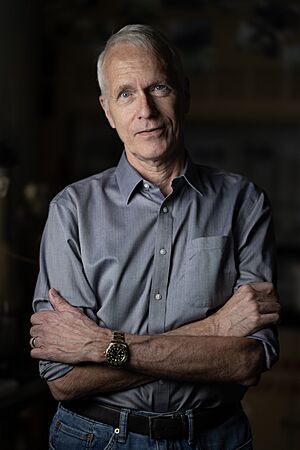Brian Kobilka facts for kids
Quick facts for kids
Brian Kobilka
|
|
|---|---|

Brian Kobilka at Stanford in 2024
|
|
| Born |
Brian Kent Kobilka
May 30, 1955 Little Falls, Minnesota, United States
|
| Education | University of Minnesota Duluth (BS) Yale University (MD) |
| Awards | Nobel Prize in Chemistry (2012) |
| Scientific career | |
| Fields | Crystallography |
| Institutions | Stanford University, Duke University |
| Academic advisors | Robert Lefkowitz |
Brian Kent Kobilka, born on May 30, 1955, is an American scientist who studies how living things work. He won the Nobel Prize in Chemistry in 2012. He shared this important award with Robert Lefkowitz. They were recognized for their amazing discoveries about how special parts of our cells, called G protein-coupled receptors, work.
Today, Brian Kobilka is a professor at Stanford University School of Medicine. He teaches in the department of Molecular and Cellular Physiology. He also helped start a company called ConfometRx. This company focuses on studying G protein-coupled receptors. In 2011, he became a member of the National Academy of Sciences, which is a great honor for scientists.
Early Life and Education
Brian Kobilka grew up in Little Falls, Minnesota. He went to St. Mary's Grade School and then graduated from Little Falls High School.
He studied at the University of Minnesota Duluth, where he earned a Bachelor's Degree. He focused on Biology and Chemistry. After that, he went to Yale University School of Medicine. There, he earned his M.D., which means Doctor of Medicine. This degree allows someone to practice as a doctor.
After medical school, he completed his residency training at Washington University in St. Louis. Later, he worked as a researcher with Robert Lefkowitz at Duke University. This is where he began his important work on a specific type of receptor called the β₂-adrenergic receptor. In 1989, Brian Kobilka moved to Stanford University. He was also a researcher for the Howard Hughes Medical Institute from 1987 to 2003.
Amazing Discoveries in Research
Brian Kobilka is famous for his research on G protein-coupled receptors, often called GPCRs. These are like tiny antennas on the outside of our cells. They receive signals from outside the cell and then send messages inside. These signals help our bodies do many things, like seeing, smelling, and even feeling pain.
His lab made a huge breakthrough by figuring out the exact molecular structure of the β₂-adrenergic receptor. This was a very difficult task. GPCRs are important targets for many medicines, but they are hard to study using a method called X-ray crystallography. Before Kobilka's work, scientists only knew the detailed structure of one other GPCR. His discovery opened the door for scientists to understand many more GPCRs. This knowledge helps in creating new and better medicines.
His work was recognized as a "runner-up" for the "Breakthrough of the Year" award by Science magazine in 2007. In 2012, he received the Nobel Prize in Chemistry with Robert Lefkowitz for his groundbreaking work on GPCRs. In 2017, he also received the Golden Plate Award from the American Academy of Achievement.
In 2017, Brian Kobilka opened the Kobilka Institute of Innovative Drug Discovery. This institute is located at the Chinese University of Hong Kong, Shenzhen in Southern China. It is part of a plan to fund research in new technologies.
Personal Life
Brian Kobilka comes from Little Falls, Minnesota. His grandfather, Felix J. Kobilka, and his father, Franklyn A. Kobilka, were both bakers in Little Falls. His grandmother, Isabelle Susan Kobilka, came from families who owned a historical brewery in Little Falls. His mother is Betty L. Kobilka.
Brian Kobilka met his wife, Tong Sun Thian, while they were both studying at the University of Minnesota Duluth. She is from Malaysia. They have two children, named Jason and Megan Kobilka.
See also
 In Spanish: Brian Kobilka para niños
In Spanish: Brian Kobilka para niños
 | Claudette Colvin |
 | Myrlie Evers-Williams |
 | Alberta Odell Jones |


